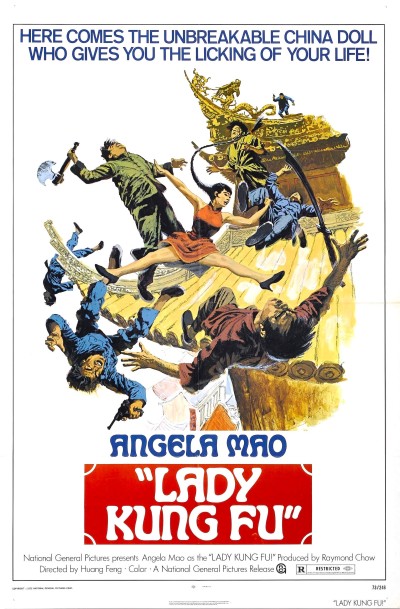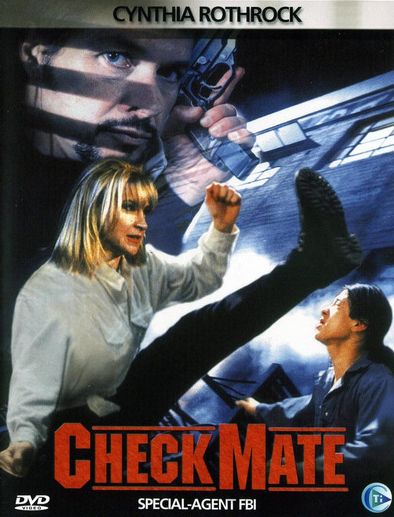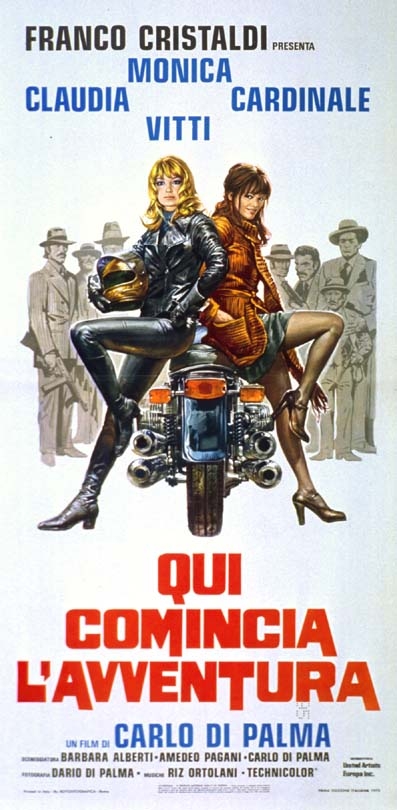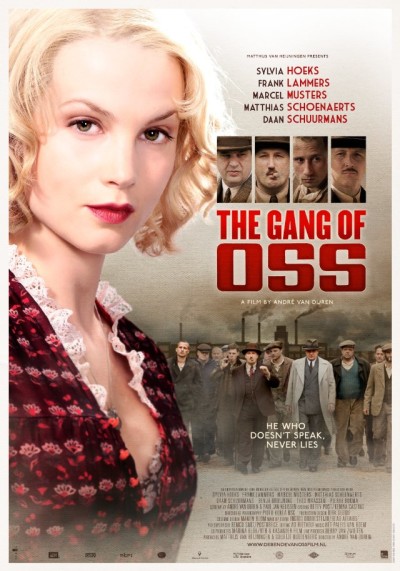★★★
“Forbearance. It’s vastly over-rated…”
 1934 Korea is under the yoke of Japanese occupation. At the hapkido school of martial arts, Yu Ying (Mao), Kao Chang (Wong) and Fan Wei (Hung) are learning the form. On graduation, they return to China and open an establishment of their own, only to fall foul of the Japanese Black Bear group, who bully both local residents and other schools, and try to run the hapkido practitioners out of town. Despite their teacher’s mantra of “Forbearance,” of which Ying has frequently to remind her colleagues, hot-headed Wei is eventually baited into fighting and killing some of the Black Bear students, and has to go into hiding. Chang’s efforts at diplomacy fare no better, leaving him beaten within an inch of his life, and the Bears seize the opportunity to tell Ying they’ll be incorporating her school into theirs. She finally realizes that turning the other cheek can only go so far before you have stand up for what’s right. Which, in this case, is some kicking of asses belong to the Japanese and their minions.
1934 Korea is under the yoke of Japanese occupation. At the hapkido school of martial arts, Yu Ying (Mao), Kao Chang (Wong) and Fan Wei (Hung) are learning the form. On graduation, they return to China and open an establishment of their own, only to fall foul of the Japanese Black Bear group, who bully both local residents and other schools, and try to run the hapkido practitioners out of town. Despite their teacher’s mantra of “Forbearance,” of which Ying has frequently to remind her colleagues, hot-headed Wei is eventually baited into fighting and killing some of the Black Bear students, and has to go into hiding. Chang’s efforts at diplomacy fare no better, leaving him beaten within an inch of his life, and the Bears seize the opportunity to tell Ying they’ll be incorporating her school into theirs. She finally realizes that turning the other cheek can only go so far before you have stand up for what’s right. Which, in this case, is some kicking of asses belong to the Japanese and their minions.
The film certainly loses points for obviously cloning Bruce Lee’s Fist of Fury, also released in 1972 and similarly based on a conflict between Japanese and Chinese martial arts schools. The strong anti-Japanese sentiment is no less shrill and strident here, and the style adopted for the fights is also largely similar, with one or other of our hero(in)es taking on a large group of rival students, before finally battling the big boss (or The Big Boss, if you prefer…). Still, this is remarkable for the future output of those involved in the film. As well as being an early entry in the careers of Mao, Wong and Hung, there are minor roles for Billy Chan, Lam Ching-Ying (Mr. Vampire), Yuen Biao, Corey Yuen (director of Yes, Madam, She Shoots Straight and DOA: Dead or Alive) and Jackie Chan, who plays one of the Black Bear students.
But it’s mainly a showcase for the leads, and the action demonstrates why they’d all go on, to varying extents, and become stars in their own right. Mao is, obviously, of most interest here. After an early demonstration in Korea, which shows her as the smartest and sharpest of the trio, she largely takes a back seat in the middle, trying to keep the peace and practice that whole “forbearance” thing, before exploding into action again at the end. Particularly cool is the use of her weighted braids as a weapon, to whip her opponent about the face – you never saw Bruce Lee do that! And this is probably what defines the film. When it’s trying to be no more than a Lee-mitator, it comes off as second best, for obvious reasons. However, when the creators go their own way, it’s inventive and much more entertaining as a result. Shame the ratio isn’t tilted more heavily towards the latter.
Dir: Huang Feng
Star: Angela Mao, Carter Wong, Sammo Hung, Bai Ying
a.k.a. Lady Kung Fu







 If ever I become an evil overlord, I will ensure my minions’ idea of security does not involve walking slowly in the open, towards an attacker, while firing wide of them from a range no greater than a slightly oversize dinner-table. That’s the first thing we take from this, which begins with a thoroughly implausible scene where Rei (Ono, who had been a part of 90’s J-pop group CoCo) manages to drown her target, a German industrialist, despite him being roughly twice her size, and without anyone in or around the swimming-pool noticing anything. She then climbs out, pulling a gun from who knows where, kills bodyguards who’d fail the Imperial Stormtrooper accuracy exam, and abseils down the side of the building to escape. That sets the tone for much of what follows, combining a reunion with someone from her past, a blossoming relationship with a chef, and her boss’s traditional surly reluctance to allow anything as banal as “personal happiness” to distract his #1 killer from her work.
If ever I become an evil overlord, I will ensure my minions’ idea of security does not involve walking slowly in the open, towards an attacker, while firing wide of them from a range no greater than a slightly oversize dinner-table. That’s the first thing we take from this, which begins with a thoroughly implausible scene where Rei (Ono, who had been a part of 90’s J-pop group CoCo) manages to drown her target, a German industrialist, despite him being roughly twice her size, and without anyone in or around the swimming-pool noticing anything. She then climbs out, pulling a gun from who knows where, kills bodyguards who’d fail the Imperial Stormtrooper accuracy exam, and abseils down the side of the building to escape. That sets the tone for much of what follows, combining a reunion with someone from her past, a blossoming relationship with a chef, and her boss’s traditional surly reluctance to allow anything as banal as “personal happiness” to distract his #1 killer from her work. Aoki appears to have streaked like a star across the pinky violence firmament, appearing only in the trilogy of which this is the first, and one other film, Gakusei yakuza, before returning to the streets whence she came. Or I like to think that was her origin, anyway, and this is less a dramatic work, than a documentary depicting her life. Sharing the same name, Rika is the child of rape, a GI impregnating her mother before being deployed to Korea, and it’s not long before one of her mother’s boyfriends/customers [the film is sketchy on this detail] has taken a similar approach to Rika. She ends up heading an all-girl gang, but is sent to a reformatory after an opposing, male gang leader accidentally dies during a fight with her. But it’s not long before our heroine escapes, only to find some rivals have taken advantage of her absence, and the rest of the gang has been abducted and are about to be sold off to Vietnam. The boss offers to sell them to her instead, and Rika blackmails her father into paying up, only for the women to be sold anyway.
Aoki appears to have streaked like a star across the pinky violence firmament, appearing only in the trilogy of which this is the first, and one other film, Gakusei yakuza, before returning to the streets whence she came. Or I like to think that was her origin, anyway, and this is less a dramatic work, than a documentary depicting her life. Sharing the same name, Rika is the child of rape, a GI impregnating her mother before being deployed to Korea, and it’s not long before one of her mother’s boyfriends/customers [the film is sketchy on this detail] has taken a similar approach to Rika. She ends up heading an all-girl gang, but is sent to a reformatory after an opposing, male gang leader accidentally dies during a fight with her. But it’s not long before our heroine escapes, only to find some rivals have taken advantage of her absence, and the rest of the gang has been abducted and are about to be sold off to Vietnam. The boss offers to sell them to her instead, and Rika blackmails her father into paying up, only for the women to be sold anyway. This obscurist Hong Kong revenge flick is a little different, mainly because the couple at the heart of the film are lesbians. Admittedly, this is largely for crass, exploitative purposes: the dialogue quoted above, pretty much confirms the makers want to tut-tut disapprovingly at the love that dare not speak its name, while simultaneously depicting it in salacious detail. Such is the nature of Cat III in the mid-90’s, this seems to want to be something like Naked Killer, released two years earlier to this in 1992, but just doesn’t have the desire to go for the full delirious insanity, necessary to pull the concept off. Particularly in the middle section, it drags horribly, with the story diverting off into the usual triad drug-smuggling, betrayal and cop investigations that we’ve seen a million times before.
This obscurist Hong Kong revenge flick is a little different, mainly because the couple at the heart of the film are lesbians. Admittedly, this is largely for crass, exploitative purposes: the dialogue quoted above, pretty much confirms the makers want to tut-tut disapprovingly at the love that dare not speak its name, while simultaneously depicting it in salacious detail. Such is the nature of Cat III in the mid-90’s, this seems to want to be something like Naked Killer, released two years earlier to this in 1992, but just doesn’t have the desire to go for the full delirious insanity, necessary to pull the concept off. Particularly in the middle section, it drags horribly, with the story diverting off into the usual triad drug-smuggling, betrayal and cop investigations that we’ve seen a million times before. The introduction tries to make it seem as if this could take place at any point in history, but there’s not much effort put into maintaining the illusion. The guns and overall setting – best described as “distressed warehouse” – puts this firmly into the post-apocalypse genre, though it’s very much at the bargain basement end of the spectrum. The heroine (adult actress Asuka) stumbles across naively innocent Anne (Akiyama), being pawed by some bad guys after straying into the danger zone to pick flowers; clearly a kinder, gentler apocalypse. After punching them out, assisted by remarkable reactions and her metal exo-skeleton, Anne is escorted back to her
The introduction tries to make it seem as if this could take place at any point in history, but there’s not much effort put into maintaining the illusion. The guns and overall setting – best described as “distressed warehouse” – puts this firmly into the post-apocalypse genre, though it’s very much at the bargain basement end of the spectrum. The heroine (adult actress Asuka) stumbles across naively innocent Anne (Akiyama), being pawed by some bad guys after straying into the danger zone to pick flowers; clearly a kinder, gentler apocalypse. After punching them out, assisted by remarkable reactions and her metal exo-skeleton, Anne is escorted back to her  Claudia (Cardinale) has a humdrum life working in a laundrette, with a sleazy husband and no hope of anything more exciting in her future. Into the laundrette storms the titular woman, Miele (Vitti), whose devil-may-care attitude enthralls Claudia, and gives her the courage to throw away her staid existence and follow the blonde on the road. Miele is initially resistant to the idea of a travelling companion, but rides to the rescue, driving her bike through the railway station where Claudia is being harassed. Miele must make a mysterious appointment in Northern Italy with her lover, but that’s okay, as Claudia has a cousin, on the way, in Naples. However, as the two make their way, it gradually becomes clear that Miele could give Baron Munchausen a run for his money, when it comes to spinning tall tales, and both her mouth and impetuous actions, are as likely to get the pair into trouble as out if it.
Claudia (Cardinale) has a humdrum life working in a laundrette, with a sleazy husband and no hope of anything more exciting in her future. Into the laundrette storms the titular woman, Miele (Vitti), whose devil-may-care attitude enthralls Claudia, and gives her the courage to throw away her staid existence and follow the blonde on the road. Miele is initially resistant to the idea of a travelling companion, but rides to the rescue, driving her bike through the railway station where Claudia is being harassed. Miele must make a mysterious appointment in Northern Italy with her lover, but that’s okay, as Claudia has a cousin, on the way, in Naples. However, as the two make their way, it gradually becomes clear that Miele could give Baron Munchausen a run for his money, when it comes to spinning tall tales, and both her mouth and impetuous actions, are as likely to get the pair into trouble as out if it. It takes real effort for a film that’s barely an hour long, significantly to overstay its welcome, but SBG manages to do exactly that, thanks to its woeful combination of shoddy action and tedious sex scenes. The heroine is teenager Mirai Asamiya (Hashimoto, about as much an actual teenager as I am), who has been transferred to a new school at the behest of her father. Little does she know, at least initially, that she is simply a tool for his revenge, headmaster Bush (Hotaru) having seduced Mirai’s mother away from her husband, and run off with her. To this end, Mirai has been brought up with what we should call, a very particular set of skills: we’ll spare you the details of exactly what the “Venus Crush” involves, but it does lead to the classic line, “He doesn’t know how dangerous your vagina is!” Before she can reach her target, she has to get close by dethroning and replacing his current enforcer of discipline, Susan (Taguchi), and also get past Bush’s lesbian daughter (Kiyokawa).
It takes real effort for a film that’s barely an hour long, significantly to overstay its welcome, but SBG manages to do exactly that, thanks to its woeful combination of shoddy action and tedious sex scenes. The heroine is teenager Mirai Asamiya (Hashimoto, about as much an actual teenager as I am), who has been transferred to a new school at the behest of her father. Little does she know, at least initially, that she is simply a tool for his revenge, headmaster Bush (Hotaru) having seduced Mirai’s mother away from her husband, and run off with her. To this end, Mirai has been brought up with what we should call, a very particular set of skills: we’ll spare you the details of exactly what the “Venus Crush” involves, but it does lead to the classic line, “He doesn’t know how dangerous your vagina is!” Before she can reach her target, she has to get close by dethroning and replacing his current enforcer of discipline, Susan (Taguchi), and also get past Bush’s lesbian daughter (Kiyokawa). I never really think of the Dutch as the organized crime type, but this film convinces me otherwise, based as it is on actual events from just before World War II. Oss is a town in the Southern half of the Netherlands and, it appears, everyone there is on the take one way or another, from insurance scams to larger scale shenanigans, all the way up to the mayor and the local priest. The federal government has sent military police to the town to keep order, but that only rankles the locals, for the cops are Protestants and they are Catholics. Johanna (Hoeks) hopes to escape a life of crime, planning to open a restaurant when her husband, Ties (Schoenaerts), gets out of jail. But it’s not as easy as it seems. Her spouse is happy to pimp her out, and local boss and Ties’s uncle, Wim de Kuiper (Musters), drags him back into his old ways. When Ties tries to force Johanna to have an abortion, she hatches a plan to have him killed by her lover (and client), Jan, although the plan only puts her deeper in the clutches of de Kuiper. But when she discovers just how low he is prepared to go, she decides he and the rest of his cronies are going down.
I never really think of the Dutch as the organized crime type, but this film convinces me otherwise, based as it is on actual events from just before World War II. Oss is a town in the Southern half of the Netherlands and, it appears, everyone there is on the take one way or another, from insurance scams to larger scale shenanigans, all the way up to the mayor and the local priest. The federal government has sent military police to the town to keep order, but that only rankles the locals, for the cops are Protestants and they are Catholics. Johanna (Hoeks) hopes to escape a life of crime, planning to open a restaurant when her husband, Ties (Schoenaerts), gets out of jail. But it’s not as easy as it seems. Her spouse is happy to pimp her out, and local boss and Ties’s uncle, Wim de Kuiper (Musters), drags him back into his old ways. When Ties tries to force Johanna to have an abortion, she hatches a plan to have him killed by her lover (and client), Jan, although the plan only puts her deeper in the clutches of de Kuiper. But when she discovers just how low he is prepared to go, she decides he and the rest of his cronies are going down.